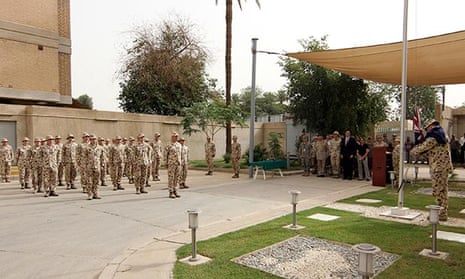Australian troops have been sent to Iraq to secure the Australian embassy.
A spokesman for the defence minister, David Johnston, said a “small Australian Defence Force liaison element” had been deployed to the embassy in Baghdad as the security situation deteriorated.
The troops are already in the capital but the spokesman would not say when they left Australia. He also would not confirm reports in the Australian Financial Review that the number of troops was about 30.
The deployment comes after a bloody few weeks in Iraq in which insurgent group Islamic State of Iraq and the Levant (Isis) captured northern and central parts of the country.
Australia has already evacuated some embassy staff and the site has been operating with minimal personnel this week.
The US president, Barack Obama, has announced the US is sending 300 military advisers to help the Iraqi army fight Isis.
Tony Abbott has said any request for military aid from America would be considered and Australia had “strong and capable” armed forces.
“Strong and capable armed forces, which have made a very significant contribution to conflicts in our region and further afield,” he told reporters in Sydney on Friday.
“But let's wait and see what, if any, requests come our way. We will carefully consider them. And I have to say that I do support the careful and measured response that President Obama has made to this.”
Abbott said the government’s current focus was making sure Australians in Baghdad were safe and there was a capacity to evacuate them quickly if needed.
“No-one should underestimate the seriousness of the situation in Iraq. This is a terrorist group seeking to create a terrorist state. And that would be a humanitarian catastrophe and a security nightmare for the region and for the wider world,” he said.
“We are of course consulting with our US allies, with our other friends and allies in the region. As far as I am aware, we have not yet been asked for any assistance. If any request for assistance comes, we will take it seriously and we will try to be helpful, because we are a strong and contributing member of the western alliance.”
Abbott and his foreign minister, Julie Bishop, have maintained contact with the US and the UK throughout the week regarding their concerns about the situation in Iraq but both have been wary about making any kind of military commitment in the region.
The Australian education minister, Christopher Pyne, said on Friday morning Australia would weigh up any request from the US for military assistance.
The deployment of troops to protect the embassy comes as Bishop announced a $5m humanitarian package to support people fleeing violence in the country.
Bishop called the situation a “serious humanitarian crisis” on Thursday.
“We express our deepest condolences for the loss of life in recent attacks, and our grave concern at the widespread displacement of Iraqis and damage to property,” she said. “The Australian government continues to acknowledge the ongoing efforts of the government of Iraq and the Kurdistan regional government to extend humanitarian support to those displaced by Isil [Isis] aggression.”
“Australia’s assistance will help protect people as they flee to safety, and provide food, medical assistance, tents, access to clean water and hygiene kits.”
About 150 Australians are estimated to be fighting with militant groups overseas and it is believed some have moved into Iraq from Syria to join Isis in the fight. The Australian immigration minister, Scott Morrison, has not ruled out cancelling the citizenship of Australians who take up arms with the group and Abbott said any who returned to Australia would be detained.
Earlier in the week, Abbott expressed concerns Iraq could be transformed into a terrorist state as Isis moved through the country, but was careful not to commit to sending troops.
“I am determined Australia will play its part in the affairs of the wider world but we have to appreciate our limitations as well as our potential, and that means we will continue to consult with our allies, particularly the United States, on what is the best way forward in an extraordinarily difficult situation,” he said on Thursday.
“This is a witches’ brew of difficulty and complexity and while we should be ready to do what good we can, we should be careful about anything that might make a bad situation worse and that’s why it’s important to consult, to consider and to plan.”
Labor defence spokesman Stephen Conroy said: “Labor supports the decision to send an ADF liaison unit to Baghdad to provide additional security to Australian embassy officials.
“Given the unstable security situation in Iraq, this is an appropriate course of action to take.”

Comments (…)
Sign in or create your Guardian account to join the discussion